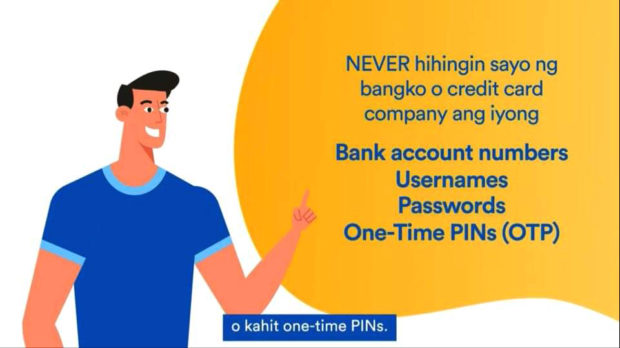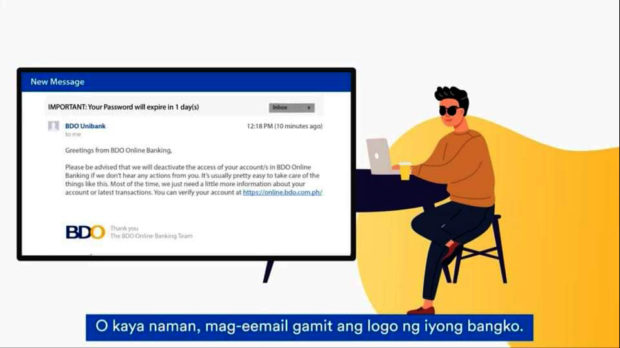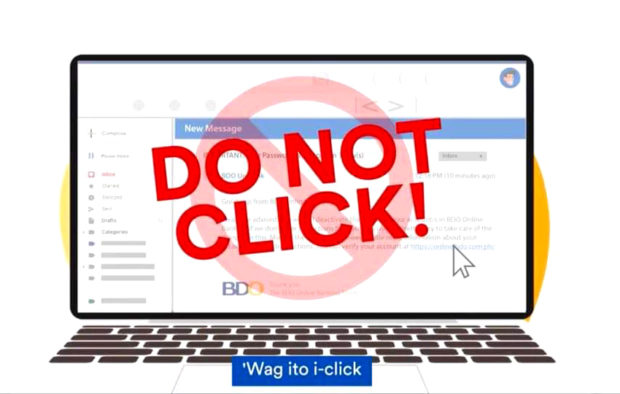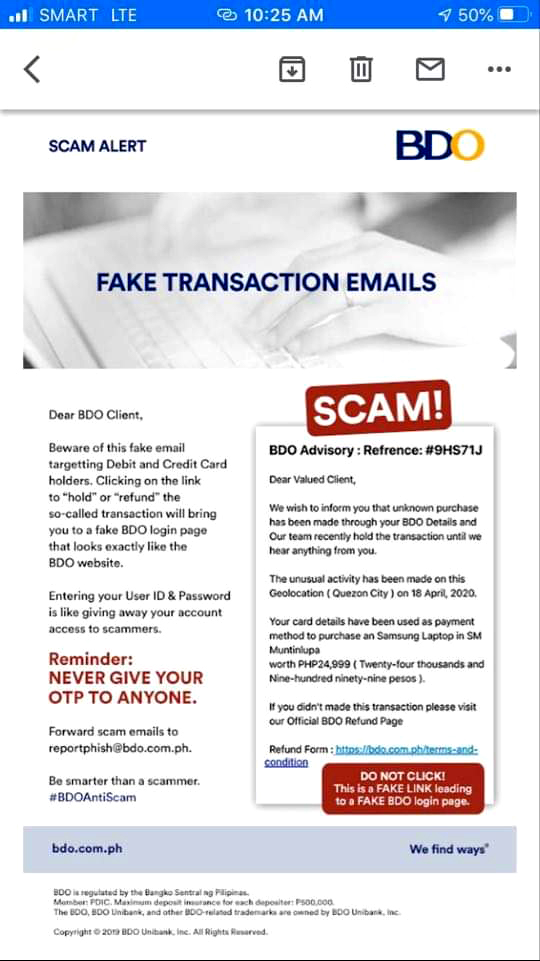How to protect yourself from cyber fraud and fake bank emails
Cyber fraud is currently on the rise in the Philippines, according to a report prepared by the Philippine National Police Anti Cybercrime Group (PNPACG).
One type that is particularly becoming more prevalent are scams that use Internet services or software with Internet access to defraud victims by stealing personal information.
These services, which occur in messaging apps, e-mail, or on websites, are used to present fraudulent solicitations to prospective victims, conduct fraudulent transactions, or transmit the proceeds of fraud to financial institutions or to others connected with the scheme.
Traditionally done via mail or phone by perpetrators, these scams are now being conducted through the use of e-mail or other Internet services as more and more cyber scams are emerging.
Warning signs of fraud
The report advises people to protect themselves against these scams by learning how to recognize the warning signs of fraud.
An e-mail from a bank that requests for updating of one’s account details through a link that lands on a bank website masquerading as the real one already raises a red flag.
Another example is a phone call from what appears to be a legitimate call center representative asking for your bank details for a supposed routine customer account update.
Phishing, also called brand spoofing, is the creation of e-mail messages and web pages that are replicas of existing and legitimate e-mails and sites. These fake websites and e-mails are used to trick users into submitting personal, financial, or password data.
These e-mails, which are formatted or written to appear from a legitimate source as though the e-mail came from your actual bank, often ask for detailed information such as credit card numbers, bank account information, social insurance numbers, and passwords that will be used to commit fraud.
The goal of criminals in using brand spoofing is to lead consumers to believe that a request for information is coming from a legitimate company, but in reality, it is a malicious attempt to collect customer information for the purpose of committing fraud.
Providing personal details such as a bank account number will make you vulnerable to having your identity stolen. This may lead to your bank account getting cleaned out or a loan taken in your name.
Banks would NEVER get customer information, such as passwords or One-Time PINs, credit card numbers and expiry date, and CVV, via an e-mail or a phone call, according to BDO, which has been very active in educating Filipinos on how to be secured and safe against these scams.

Tip #1. Never share personal information with anyone online or offline
BDO always reminds its clients to go to BDO’s official webpage www.bdo.com.ph to do online banking. Accessing the bank’s website requires stringent measures to enter the website.
It is more advisable to visit your bank personally to update your account details as banks require official credentials such as government IDs and personal authorization and signatures to effect changes in a client’s account details.
Anti-fraud video
To caution clients and the general banking public against these scams, BDO has prepared an anti-fraud video. BDO encourages people to share this video with friends and family so that they may be warned against these scams.
According to BDO, there are ways to protect yourself from phishing and they include the following:
Have your PCs or devices installed with anti-virus software, spyware filters, e-mail filters and firewall programs. Also regularly update antivirus, antispyware and firewall software.
Do not reply to any e-mail that requests your personal information.
Never click on the link (a link to a supposedly legitimate bank website) pasted on the e-mail, which is usually included in a call to action letter format.

Tip #2. Don’t let a copycat fool you
When you receive a suspicious e-mail, contact the bank immediately and report your suspicions. For BDO clients, they may report suspicious incidents to: [email protected], or reach BDO by logging in Messenger and looking for BDO Customer Care with the blue verified checkmark from Facebook.
Look for misspelled words in the e-mail. Misspelled words are clear signs that the e-mail did not come from a reliable or reputable source.
Be mindful of personal information you post on social networking sites. Scammers often mine personal information from social media profiles and posts. They use publicly available information to identify potential victims.
Never open attachments from e-mails coming from suspicious people or strangers. An e-mail with an attachment that arrives unexpectedly could contain malware.

Tip #3. Do not click on the link
Shred all business documents/legal letters before you dispose of them. These are also materials that scammers look into to get your personal information, such as e-mails, phone numbers, or addresses.
White-collar crime
Described as a white-collar crime, Internet fraud is growing rapidly as the Internet itself, according to the PNPACG report.
The report added that professional scammers are getting sharper at refining their schemes as fast as their traps are being discovered.

Providing your bank account details to a scammer will lead to your bank account getting cleaned out or a loan taken in your name.
“Many scams originate overseas or take place over the Internet, making them very difficult to track down and prosecute. If you lose money to a scam, it is unlikely that you will be able to recover your loss. And these scams target people of all backgrounds, ages and income levels,” the report said.
In 2016, cybercrime cost the global economy $450 billion according to an analyst report. In the Philippines, some studies estimate losses from fraudulent credit card transactions alone rose to P506 million in 2016, while the number of online scam cases reached over 500.
ADVT